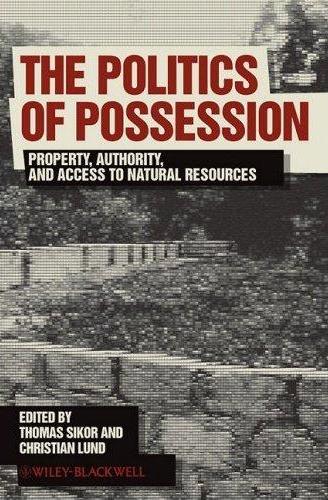
par Admin-Apad | 31 Mar 2015
Thomas Sikor and Christian Lund ( Edit.)-2009-Politics of Possession.
Access to resources is often contested and rife with conflict. This holds particularly true in societies characterized by normative pluralism such as post–colonial and post–socialist countries. Access and property are very dynamic because they are joined to questions of power and authority. The process of seeking authorization for property claims works to legitimize the authorizers, and the efforts undertaken by politico–legal institutions to gain legitimacy underpin and undermine various claims of access and property. This book includes some of the latest theoretical work on the dynamics of access, property, and authority. Bringing the debate about access and property to speak to issues of power and authority, it also offers a thought–provoking approach to the study of everyday processes of state formation. Its contributions explore the politics of possession from a wide empirical compass of original research spanning Latin America, Africa, South–East Asia, and Eastern Europe.
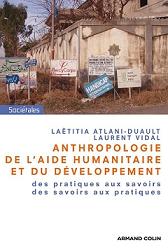
par Admin-Apad | 31 Mar 2015
Laetitia Atlani-Duault & Laurent Vidal- 2009-
Lorsque les aventuriers de l’Arche de Zoé veulent agir pour le bonheur des autres, c’est l’aide humanitaire dans son ensemble qui est mise en accusation. Au-delà du déchaînement médiatique, se joue là pour l’anthropologie la figure bien connue de la rencontre avec l’autre qu’il s’agit d’« aider ». Dans ce contexte troublé, ce livre vient à point nommé pour exposer ce que peut être, aujourd’hui, une anthropologie de l’aide humanitaire et du développement, entre engagement et distance critique. Plaçant au centre de ses préoccupations les hommes et les femmes en action qui font, au quotidien, leurs sociétés, leurs cultures et leur développement, cette anthropologie de l’aide humanitaire et du développement relève le défi de mettre ces mondes – souvent divergents et conflictuels – en relations, afin de leur donner un sens et une forme sur lesquels il est possible d’agir.
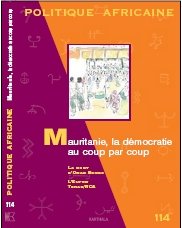
par Admin-Apad | 31 Mar 2015
Riccardo Ciavolella & Marion Fresia (eds) -2009- – Politique africaine n° 114
Depuis l’instauration du multipartisme au début des années 1990, la Mauritanie alterne entre coups d’État et phases de démocratisation. Ce dossier revient sur certaines questions érigées en enjeux démocratiques majeurs de la scène publique mauritanienne, en particulier le retour des réfugiés expulsés de Mauritanie en 1989 et la lutte contre la «terreur» islamique. Dans une perspective de longue durée, il analyse également les éléments de rupture et de continuités liés aux bouleversements politiques récents : par-delà la discontinuité des régimes, il s’interroge ainsi sur la constitution d’une classe hégémonique dans le pays, tout en mettant en évidence les nouvelles formes de mobilisation et de contestation sociale, y compris parmi les groupes subalternes.
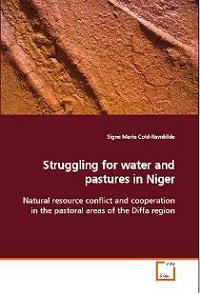
par Admin-Apad | 31 Mar 2015
Signe-Marie Cold- Ravnkilde – 2009-
In Niger the question of rights to pastoral resources illustrates how ideologies in Western mindset have been transported to the African continent. This book explores the philosophical assumptions behind the rules governing rights to water and pastures. It reveals that points of contest between universalism and cultural relativism in regard to property, public authority and justice are reflected in both national legislation and in international development practices. Ravnkilde accounts for the outcome of conflict and cooperation and explains why herders, like people in other cultures, conceive of their rights in a contradictory manner: as requiring adoption to cultural specific conditions and yet applies universally to all.
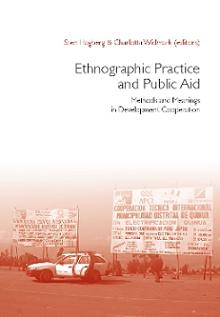
par Admin-Apad | 31 Mar 2015
Sten Hagberg & Charlotta Widmark (eds.) – 2009
The ambition of this collection of essays is to explore the interface of anthropology and development with a particular focus on what anthropologists involved in public aid and development cooperation do in terms of theory, method and ethnography. There are a limited number of contexts in which anthropologists are consulted in development work, which in turn affect the anthropologists’ positioning. Common to these essays is that they offer analyses of the different locations – e.g. advisory positions, ministerial policy work, academic in consultation assignment, field officer, programme officer at HQ – from which anthropology and anthropologists engage with development. Aimed at an audience of academics and students as well as development practitioners and policy makers, the essays in this book reflect upon anthropological practice in development contexts to explore new forms of anthropological engagement.







Recent Comments